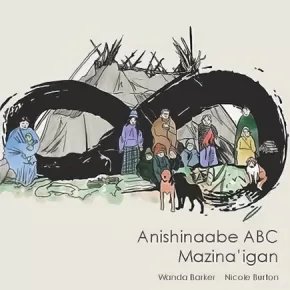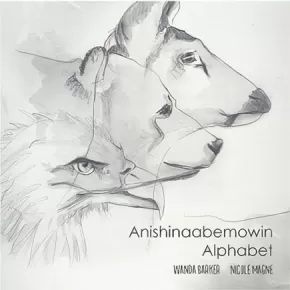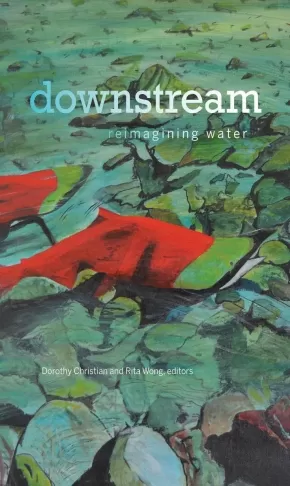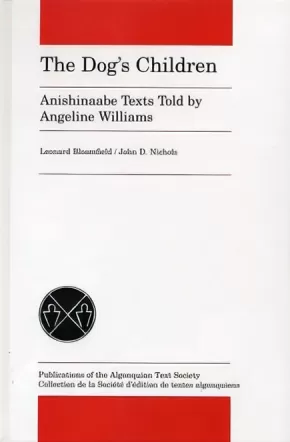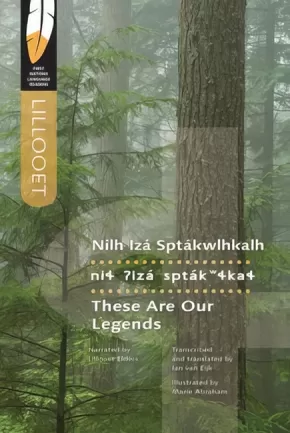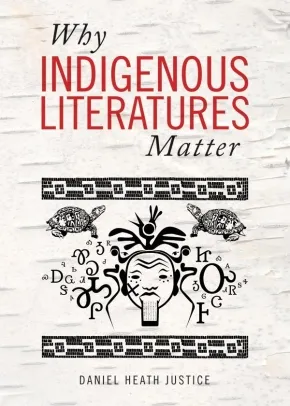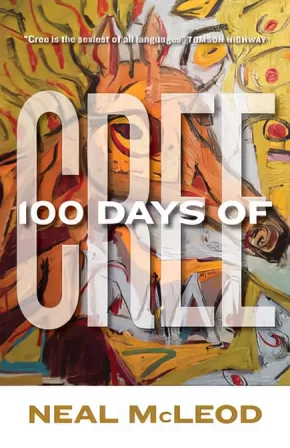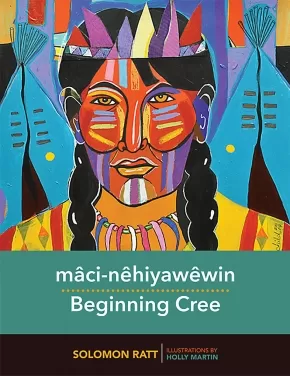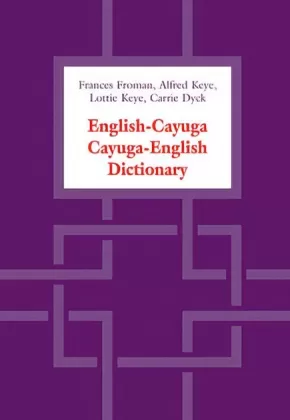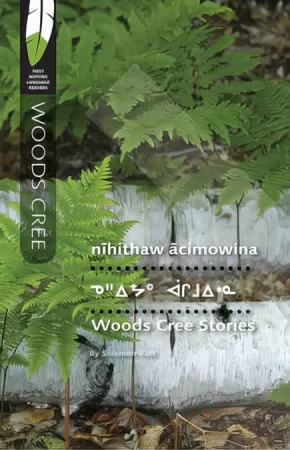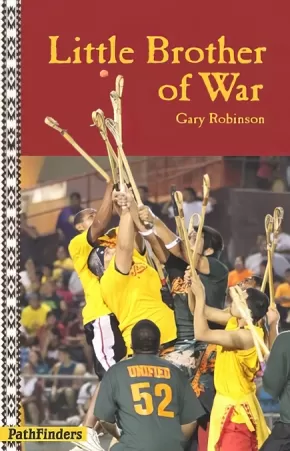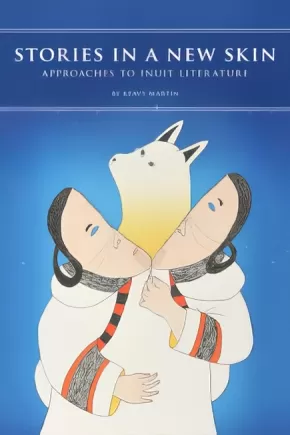
Literacy
46
-
60
of
66 Results;
Sort By
Go To
of 5
Anishinaabe ABC Mazina’igan
$10.00
Artists:
Format:
Paperback
Text Content Territories:
Indigenous Canadian; First Nations; Anishinaabeg; Ojibway;
ISBN / Barcode: 9781927849422
Synopsis:
Synopsis:
It's never too early to start teaching children their First Nations language, and Anishinaabe ABC Mazina'igan is a great tool to assist with learning.
This book is the second in a series by Language Facilitator, Wanda Barker. It is a great tool to assist with learning the Ojibwe language. Anishinaabe ABC Mazina’igan is filled with beautiful illustrations, Anishinaabemowin/Ojibwe sentences and their English translations. The images can serve as a starting point for discussion of the cultural relevancy of the sentences associated with each letter.
This book can be used by students, parents and teachers, young and old. It is written in the double vowel writing system and is intended to show the sequence of the Ojibwe alphabet. The images can serve as a starting point for discussion of the cultural relevancy of the sentences associated with each letter.
Educator Information
This book is written in the Ojibwe language with a glossary at the back in Ojibwe and English. It is useful for anyone wanting to learn the Ojibwe language.
Anishinaabemowin Alphabet
$10.00
Artists:
Format:
Paperback
Text Content Territories:
Indigenous Canadian; First Nations; Anishinaabeg; Ojibway;
Reading Level: N/A
ISBN / Barcode: 9781927849354
Synopsis:
Synopsis:
It’s never too early to start teaching children their First Nations language, and Anishinaabemowin Alphabet is the perfect place to begin. This book is filled with beautifully shaded illustrations, Anishinaabemowin/Ojibwe words and their English translations, and it can be used by students, parents and teachers young and old. It is written in the double vowel writing system and is intended to show the sequence of the Ojibwe alphabet. The images can serve as a starting point for discussion of the cultural relevancy of the word associated with each letter.
Educator Information
This book is written in the Ojibwe language. An English translation for each word is provided at the back of the book.
The publisher recommends this book for children or anyone learning the Ojibwe language.
downstream: reimagining water
$36.99
Format:
Paperback
Text Content Territories:
Indigenous Canadian;
ISBN / Barcode: 9781771122139
Synopsis:
Synopsis:
downstream: reimagining water brings together artists, writers, scientists, scholars, environmentalists, and activists who understand that our shared human need for clean water is crucial to building peace and good relationships with one another and the planet. This book explores the key roles that culture, arts, and the humanities play in supporting healthy water-based ecology and provides local, global, and Indigenous perspectives on water that help to guide our societies in a time of global warming. The contributions range from practical to visionary, and each of the four sections closes with a poem to encourage personal freedom along with collective care.
This book contributes to the formation of an intergenerational, culturally inclusive, participatory water ethic. Such an ethic arises from intellectual courage, spiritual responsibilities, practical knowledge, and deep appreciation for human dependence on water for a meaningful quality of life. downstream illuminates how water teaches us interdependence with other humans and living creatures, both near and far.
Reviews
"Downstream stakes out a bold and creative claim to collaborative and cross-cultural eco-spiritual-neo-traditional knowing and, with it, new approaches to policy and action. A timely read that lends depth and resonance to some of the material and voices [in other books on the subject]." — Heather Menzies, Literary Review of Canada, June 2017
"This rich collection brings together the work of artists, writers, scientists, scholars, environmentalists, and activists, all focusing on the looming global water crisis. ... Writing styles vary from piece to piece throughout the book—poetic, personal, journalistic, and academic—but the shifts between each are well worth navigating for any reader interested in human futures on Earth."— Publishers Weekly, August 2017
"This collection of works successfully expands our knowledge of and experience with water by merging natural science, social science, arts, and humanities approaches to water. It offers new, innovative, and engaging ways to think about and experience water, especially as it relates to life and vitality."— Sara Beth Keough, American Review of Canadian Studies, November -0001
Educator Information
This collection of essays is useful for these course/subject areas or topics: Language Arts & Disciplines; Creative Writing; Indigenous Studies; Poetry; Environmental Studies; Environmental Humanities.
Table of Contents
Introduction: Re-storying Waters, Re-storying Relations / Rita Wong and Dorothy Christian
Part I: Contexts for Knowing and Unknowing Water
1. Planetary Distress Signals / Alanna Mitchell
2. Water / Lee Maracle
3. Interweaving Water: The Incremental Transformation of Sovereign Knowledge into Collaborative Knowledge / Michael D. Blackstock
4. Water and Knowledge / Astrida Neimanis
5. Excerpts from “a child’s fable” / Baco Ohama
Part II: Water Testimonies: Witness, Worry, and Work
6. Water: The First Foundation of Life / Mona Polacca
7. From Our Homelands to the Tar Sands / Melina Laboucan Massimo
8. Keepers of the Water: Nishnaabe-kwewag Speaking for the Water / Renee Elizabeth Mzinegiizhigo-kwe Bedard
9. Water Walk Pedagogy / Violet Caibaiosai
10. A Response to Pascua Lama / Cecilia Vicuna
Part III: Shared Ethical and Embodied Practices
11. Moving with Water: Relationship and Responsibilities / Alannah Young Leon and Denise Marie Nadeau
12. Bodies of Water: Meaning in Movement / Seonagh Odhiambo Horne
13. Upstream: A Conversation with Water / Cathy Stubington
14. Ice Receding, Books Reseeding / Basia Irland
15. Tsunami Chant / Wang Ping
Part IV: A Respectful Co-existence in Common: Water Perspectives
16. Listening to the Elders at the Keepers of the Water Gathering /Radha D’Souza
17. Coastal Waters in Distress from Excessive Nutrients / Paul J. Harrison
18. Bodies of Water: Asian Canadians In/Action with Water /Janey Lew
19. Permeable Toronto: A Hydro-Eutopia / Janine MacLeod
20. Saturate/Dissolve: Water for Itself, Un-Settler Responsibilities, and Radical Humility / Larissa Lai
21. Bring Me Back / Janet Rogers
Additional Information
300 pages | 6.00" x 9.00"
Little Athapapuskow: A Métis Love Story (4 in stock, Out of Print)
$20.00
Artists:
Format:
Paperback
Text Content Territories:
Indigenous Canadian; Métis;
ISBN / Barcode: 9781926795829
Synopsis:
Synopsis:
Little Athapapuskow is collection of poems named after a lake Guy Freedman grew up on near Flin Flon, Manitoba. They represent his efforts to challenge Catholicism and its complicity with the Confederation project, which dismantled the New Nation developing in the Canadian Northwest. The poems are organized into three parts—past, present, and future—and they address the inter-generational impacts of the Church on his family in relation to the doctrine of the Holy Trinity. This book is his love song to his home and to his country.
Educator Information
Recommended resource for Grades 10-12 English Language Arts and Social Studies.
Contains poems about the history of the Métis people, family, love, celebration of culture, colonialism, religion, violence.
Caution: Some poems contain strong language and mature subject matter, such as discussions of violence, alcoholism, and sexuality.
Additional Information
86 pages | 7.25" x 5.75 "
The Dog’s Children: Anishinaabe Texts told by Angeline Williams
$32.95
Editors:
Format:
Paperback
Text Content Territories:
Indigenous American; Native American; Anishinaabeg; Ojibwe (Chippewa);
Grade Levels: University/College;
ISBN / Barcode: 9780887558337
Synopsis:
Synopsis:
In 1941, Angeline Williams, an Anishinaabe elder left her home on an island in the St. Mary’s River between Michigan and Ontario and travelled south to North Caroline to teach the Ojibwe (Chippewa) language. At the Linguistic Institute, a summer school of linguistics, Angeline Williams spoke words and sentences and told anecdotes and stories to give the students practice in transcribing an analyzing the structure of an unwritten language.
The Dog’s Children includes twenty stories dictated to the class and the teaching staff, Charles F. Voegelin, and Leonard Bloomfield, as later edited by Bloomfield. The manuscript from which this edition has been prepared is now at the National Anthropological Archives at the Smithsonian Institution. Presented in Ojibwe, with English translations by Bloomfield. The volume also contains an Ojibwe-English glossary and other linguistic study aids.
Reviews
"This book is tremendously valuable as a tool for understanding not only linguistic research but for understanding the life and culture of an Ojibwe woman. Angeline Williams, Biidaasigekwe or "Sunlight Woman," came to Virginia in 1941 from Sugar Island on the St. Mary's River to teach the Ojibwe language to Leonard Bloomfield. Bloomfield's subsequent translations and understanding of the Algonquian language family led to significant advances and changes in the study of linguistics. This series of Ojibwe stories and their up-to-date translations to English illustrate the thoroughness of Bloomfield's linguistic research.... The Ojibwe word inaajimowin means "story" in English. Throughout this book, Angeline Williams weaves Ojibwe "stories" that are influenced by myth, regionality, and family. The oral quality of her stories is rich in meaning and humor. More important these stories remain as an ethnographic record of her life and her contributions tofurther cultural understanding of the Ojibwe people. The updated version of Bloomfield's notes and the orthography installed by Nichols serves to enhance the fine translations and culturally rich Ojibwe stories. The notes on inflectional endings and the glossary with a dictionary of Ojibwe-to-English and English-to-Ojibwe translations make the book even more valuable as a linguistic resource tool. The mirror-like lay-out of the book also aids in understanding the translations. With alternating pages of Ojibwe and English, it is easy to compare the translations paragraph by paragraph, even line by line." - Paul C. Brooke, Department of English, Iowa State University
Additional Information
268 pages | 6.00" x 9.00"
These Are Our Legends
$24.95
Format:
Paperback
Text Content Territories:
Indigenous Canadian; First Nations; Salish; Interior Salish; St'at'imc (Lillooet, Lil'Wat);
Grade Levels: 12; University/College;
ISBN / Barcode: 9780889773967
Synopsis:
Synopsis:
Like all First Nations languages, Lillooet (Lil'wat) is a repository for an abundantly rich oral literature. In These Are Our Legends, the fifth volume of the First Nations Language Readers series, the reader will discover seven traditional Lillooet sptakwlh (variously translated into English as "legends," "myths," or "bed-time stories.")
These texts are presented in a technical transcription that can be used by linguists, and also in a practical orthography that can be used by Lillooet speakers themselves. An English translation is also given. Basic information on the Lillooet language, its grammar, and a glossary are included in the volume.
With thanks to the Mount Currie Cultural Centre and the Tszil Publishing House.
Series Information
These Are Our Legends is part of the First Nations Language Readers series. With a mix of traditional and new stories, each First Nations Language Reader introduces an Indigenous language and demonstrates how each language is used today. The University of Regina Press’s long-term goal is to publish all 60+ Indigenous languages of Canada.
Additional Information
120 pages | 5.50" x 8.50" | Narrated by Lillooet Elders | Transcribed and Translated by Jan van Eijk
Authenticity Note: This book has been labelled as containing Authentic Indigenous Text because of the narration from Lillooet Elders. It is up to readers to determine if this text will work as an authentic resource for their purposes.
Why Indigenous Literatures Matter
$19.99
Format:
Paperback
Text Content Territories:
Indigenous;
Grade Levels: University/College;
ISBN / Barcode: 9781771121767
Synopsis:
Synopsis:
Part survey of the field of Indigenous literary studies, part cultural history, and part literary polemic, Why Indigenous Literatures Matter asserts the vital significance of literary expression to the political, creative, and intellectual efforts of Indigenous peoples today. In considering the connections between literature and lived experience, this book contemplates four key questions at the heart of Indigenous kinship traditions: How do we learn to be human? How do we become good relatives? How do we become good ancestors? How do we learn to live together? Blending personal narrative and broader historical and cultural analysis with close readings of key creative and critical texts, Justice argues that Indigenous writers engage with these questions in part to challenge settler-colonial policies and practices that have targeted Indigenous connections to land, history, family, and self. More importantly, Indigenous writers imaginatively engage the many ways that communities and individuals have sought to nurture these relationships and project them into the future.
This provocative volume challenges readers to critically consider and rethink their assumptions about Indigenous literature, history, and politics while never forgetting the emotional connections of our shared humanity and the power of story to effect personal and social change. Written with a generalist reader firmly in mind, but addressing issues of interest to specialists in the field, this book welcomes new audiences to Indigenous literary studies while offering more seasoned readers a renewed appreciation for these transformative literary traditions.
Awards
- 2019 PROSE Award for Literature
100 Days of Cree
$24.95
Format:
Paperback
Text Content Territories:
Indigenous Canadian; First Nations; Cree (Nehiyawak);
ISBN / Barcode: 9780889774292
Synopsis:
Synopsis:
As an Elder once said, "Learn one Cree word a day for 100 days, and emerge a different person."
In 100 Days of Cree, Neal McLeod offers us a portal into another way of understanding the universe--and our place within it--while demonstrating why this funny, vibrant, and sometimes salacious language is "the sexiest of them all" (according to Tomson Highway).
Based on a series of Facebook posts, the 100 short chapters or "days" in the book present a chain of related words, some dealing with the traditional--the buffalo hunt, the seasons--and others cheekily capturing the detritus of modern life--from Internet slang to Johnny Cash songs to Viagra.
The result is both an introduction to the most widely spoken Indigenous language in Canada and the opportunity to see the world, and ourselves, in another way.
Reviews
"The nonfiction book is divided into 100 themes and offers Cree words and English explanations for everything from traditional subjects such as powwows and medicine to modern subjects such as Facebook and Star Wars. It also includes a guide to pronunciation written by Arok Wolvengrey, a linguist and the author of a Cree-English dictionary. 'When we think about indigenous languages, there’s a part of us that thinks they’re dying languages, ' URP publisher Bruce Walsh said. 'And then this manuscript comes in that demonstrates a living, vital language.' McLeod said that he and Wolvengrey worked to keep a balance between traditional usage and modern adaptations. 'To revitalize our languages, we have to do two things: we have to document the classical terminology, because within that terminology are all of our metaphors and idioms; but we also have to think of how to put old words together, to coin words, to describe the contemporary world.'" — Laura Godfrey, Publishers Weekly
Additional Information
325 pages | 5.50" x 7.00"
mâci-nêhiyawêwin: Beginning Cree
$34.95
Artists:
Format:
Coil Bound
Text Content Territories:
Indigenous Canadian; First Nations; Cree (Nehiyawak);
ISBN / Barcode: 9780889774353
Synopsis:
Synopsis:
Designed as an introduction for Cree language learners, Beginning Cree acts as a self-study aid--a much-needed resource in today's world where most students cannot speak Cree fluently. Basic grammar units and everyday vocabulary items guide the student through the building blocks of the language, and expansion drills and exercises reinforce lessons and prepare the student for further study. With over 100 delightful illustrations, Beginning Cree grounds the language in traditional and contemporary contexts.
Educator & Series Information
This book is recommended for ages 12+.
Table of Contents
Chapter One: Introduction
Chapter Two: Nouns
Chapter Three: Prepositions and Pronouns
Chapter Four: Animate Intransitive Verbs
Chapter Five: Inanimate Intransitive Verbs
Chapter Six: Possessives: Kinship Terms
Chapter Seven: Transitive Inanimate Verbs
Chapter Eight: Transitive Animate Verbs
Verb Charts
Conjugation Patterns
Vocabulary List
Bibliography
Notes
The Canadian Indigenous Books for School list recommends this resource for Grades 1-12 for these subject areas: Indigenous Language Studies, Language Studies.
Part of the Indigenous Languages for Beginners series.
The book is specifically geared towards learners of the Plains Cree "Y" dialect, also known as the "Y" dialect.
Additional Information
165 pages | 8.50" x 11.00" | black and white illustrations | spiral bound
English-Cayuga/Cayuga-English Dictionary
$81.00
Format:
Paperback
Text Content Territories:
Indigenous Canadian; First Nations; Haudenosaunee (Iroquois); Cayuga;
Reading Level: N/A
ISBN / Barcode: 9781442627093
Synopsis:
Synopsis:
The first comprehensive lexicographic work on Cayuga, an Iroquoian language spoken in southern Ontario at Six Nations of the Grand River, this dictionary, combines the work of Dyck, a professor of linguistics, and Froman, Keye, and Keye, all Cayuga language teachers at Six Nations. It contains over 3000 entries, including 1000 verb forms and many nouns never before printed; extensive cross-referencing, thematic appendices that highlight cultural references and provide 1600 further entries, and a short grammatical sketch complete this accomplished work.
Entries in the main dictionary are organized by bases, which will make the dictionary especially helpful to those learning Cayuga as a second language. The dictionary's accuracy and extensiveness will make it an indispensable reference not only to the Cayuga speaker and student, but also to other Iroquoian speakers, linguists, anthropologists, and historians of Indigenous Peoples.
Produced under the auspices of the Sweetgrass First Nations Language Council Inc.
Reviews
"The first extensive dictionary of Cayuga, this benchmark work documents the language in 3,000 entries and in word lists organized thematically in appendixes ... A valuable tool for linguists of Iroquoian languages and anthropologists, as well as those who study the Cayuga language. Summing up: Highly recommended."— R. Hanson, Choice
"A major milestone in Iroquoian studies and an extremely important tool in the preservation of the Cayuga language."— Blair A. Rudes, Department of English, University of North Carolina at Charlotte
Additional Information
786 pages | 6.88" x 9.73" | Paperback
Woods Cree Stories
$24.95
Format:
Paperback
Text Content Territories:
Indigenous Canadian; First Nations; Cree (Nehiyawak);
Grade Levels: University/College;
ISBN / Barcode: 9780889773455
Synopsis:
Synopsis:
Humour is not only the best medicine; it is also an exceptionally useful teaching tool.
So often, it is through humour that the big lessons in life are learned--about responsibility, honour, hard work, and respect. Cree people are known for their wit, so the tales in Woods Cree Stories are filled with humour. The book includes nine stories--including Boys Get Lost, Foolishness, and Animals Become Friends--and a Woods Cree-to-English glossary.
All the stories are presented in Cree syllabics, Standard Roman Orthography, and English translation and can be enjoyed by those new to the language and more advanced learners.
Educator & Series Information
Woods Cree Stories is part of the First Nations Language Readers series. With a mix of traditional and new stories, each First Nations Language Reader introduces an Indigenous language and demonstrates how each language is used today. The University of Regina Press’s long-term goal is to publish all 60+ Indigenous languages of Canada.
Additional Information
138 pages | 5.50" x 8.50"
Little Brother of War
$11.95
Format:
Paperback
Text Content Territories:
Indigenous American; Native American; Choctaw;
ISBN / Barcode: 9781939053022
Synopsis:
Synopsis:
“Dad, I don’t want to play football or baseball,” I blurted out.
“Oh, what do you want to play?” he asked. “Basketball? I hope its not soccer. That’s not even a real American sport.”
“Stickball,” I said.
“Say what?” Dad replied. He almost spit out a mouth full of coffee.
“Stickball. Toli.”
“You mean running around in your shorts behind the community center on Saturdays? That’s not a real sport.”
“Actually it is a real sport, and I’m talking about playing on a team that will compete at Choctaw Fair next summer.”
Dad slammed his fist down on the table. The plates and glasses shook. I almost jumped out of my seat.
Sixteen-year-old Mississippi Choctaw Randy Cheska lived most of his young life in the shadow of his older football-hero brother, Jack. After Jack is tragically killed while serving in Iraq, Randy's father puts even more pressure on Randy to excel in football. Randy has absolutely no desire or skills to play high school sports but when he discovers that he's good and stickball and loves the game, Randy jumps at the chance to play when its offered. His father considers the sport a relic of the Choctaw past when it was known as the Little Brother of War and used to settle disputes between communities. For Randy, stick ball provides him with a new sense of self-worth and a new direction in life.
Gary Robinson is a writer and filmmaker of Cherokee and Choctaw descent. He has spent 25 years working with American Indian communities to tell the stories of Native people. His previous works include From Warriors to Soldiers and The Language of Victory. He lives in rural central California.
Educator & Series Information
Reading Level: 3.9
This book is part of the PathFinders series of Hi-Lo (high interest, low readability) novels, which offers the following features:
• Indigenous teen protagonists
• Age appropriate plots
• 2.5 – 4.5 Reading Level
• Contemporary and historical fiction
• Indigenous authors
The PathFinders series is from an American publisher. Therefore, Indigenous terminology in the PathFinders books is not the same as Canadian Indigenous terminology. This prompts a useful teaching moment for educators in discussing appropriate terminology use in Canada.
Additional Information
120 pages | 4.53" x 7.00"
Writing to Wake the Soul: Opening the Sacred Conversation Within (3 in stock) - ON SALE!
$16.00 $22.00
Format:
Paperback
ISBN / Barcode: 9781582705996
Synopsis:
Synopsis:
This is a book about words, but it’s equally about what pulses beneath them, what lies between the lines. It opens a path to the inner self and to the timeless wisdom deep within. By focusing on ten key spiritual words, Hering provides an elegant practice for readers to explore a greater intimacy with their spirituality, their soul, and their world.
Whether you approach this book primarily as a reader or a writer, you can open a rich correspondence with yourself and learn what your own heart has to say. Karen Hering offers a path of self-exploration and a contemplative practice of writing that engages memory and imagination, story and poetry, images and the timeless wisdom of world religions and mythology. It will open your ear to your own truths while opening your heart to the world around you.
Blending writing prompts, meditations, and stories, this book invites you to begin wherever you are and discover your own unique relationship with language, spirituality, and the world around you. The next chapter is yours to write, and Writing to Wake the Soul offers all you need to write it.
Stories in a New Skin: Approaches to Inuit Literature
$27.95
Format:
Paperback
Text Content Territories:
Indigenous Canadian; Inuit;
ISBN / Barcode: 9780887557361
Synopsis:
Synopsis:
In an age where southern power-holders look north and see only vacant polar landscapes, isolated communities, and exploitable resources, it is important to point out that the Inuit homeland is, in fact, united by extensive philosophical, political, and literary traditions. Stories in a New Skin is a seminal text that confirms the “national” scope of Inuit literature and introduces a model for Inuit literary criticism. Author Keavy Martin analyzes writing and storytelling from a range of genres and historical periods – the classic stories and songs of the oral tradition, life writing, oral histories, and contemporary fiction, poetry, and film – and discusses the ways in which these texts constitute a national literary tradition. She highlights characteristics of Inuit intellectual discourse, demonstrates potential approaches to the material, and introduces ways of drawing methodologies from the texts themselves.
Reviews
"Martin has listened carefully to indigenous authors and critics who have for decades argued that their literature should be analyzed on its own terms, according to tribal and community perspectives and in keeping with indigenous knowledges. While Martin is not Inuit, she has gone to great lengths to visit the Far North, learn Inuktitut, and live for periods of time among the people. This lived experience, combined with her excellent literary theoretical and analytical skills, has produced this gorgeous book. In it Martin brings new perspectives to published and oral texts. As she argues, the most appropriate and sophisticated approach to Inuit stories is to recognize how both tradition and adaptation have shaped them."— Jury's Comments, 2012 Gabrielle Roy Prize
How To Tell a Legend (2 In Stock) - ON SALE
$7.96 $9.95
Format:
Paperback
ISBN / Barcode: 9780778716372
Synopsis:
Synopsis:
A legend is a story about a hero, a people, or a natural phenomena. Popular legends include King Arthur and the Knights of the Round Table, Blackbeard, and Robin Hood. This exciting new title teaches readers about the common characteristics found in legends from around the world. Engaging writing activities guide readers as they use these characteristics to create their own legends.
Sort By
Go To
of 5

